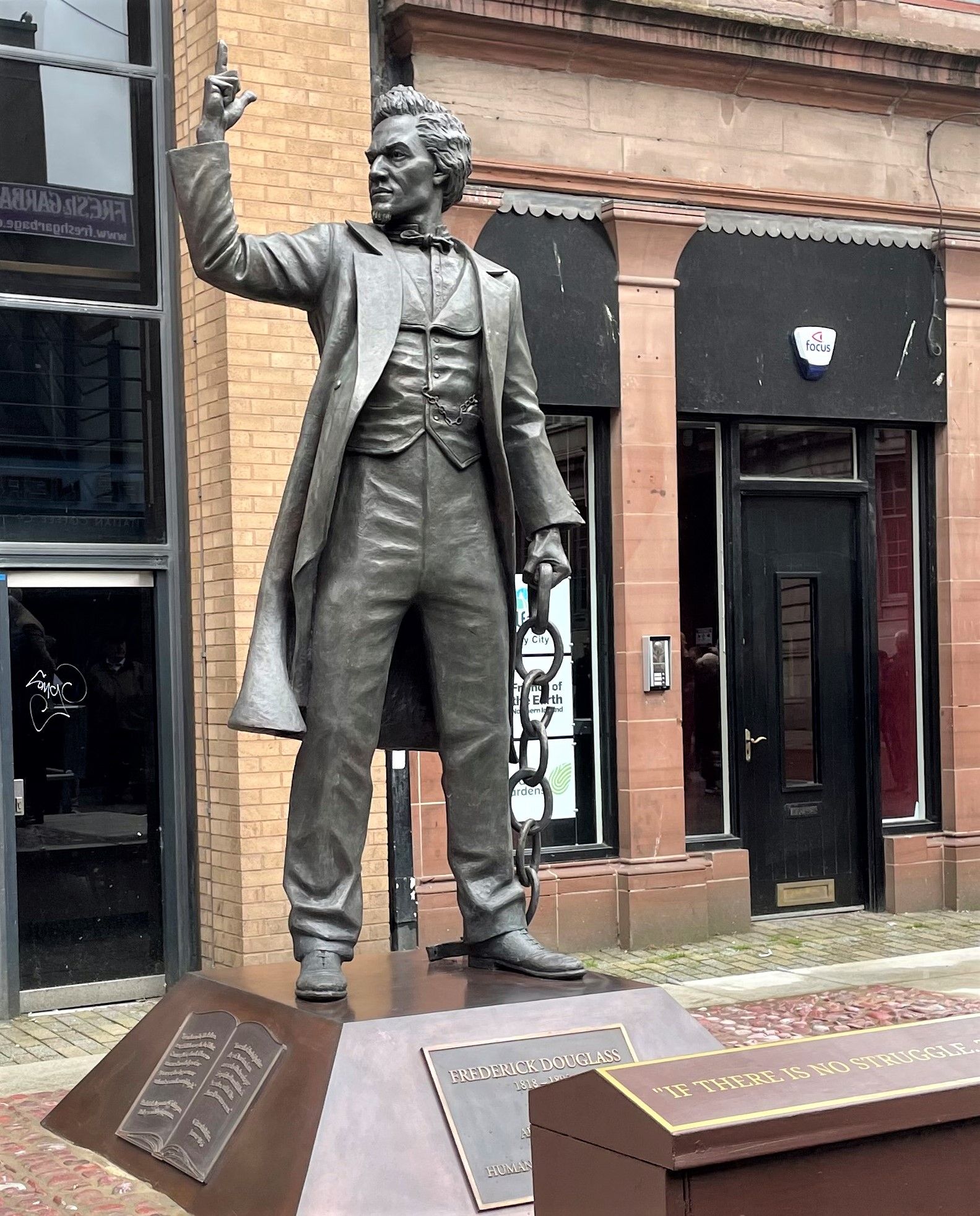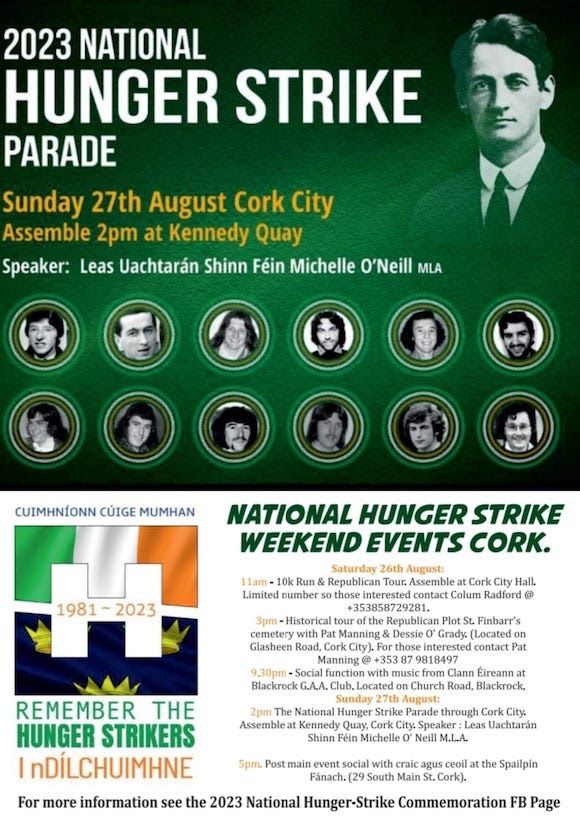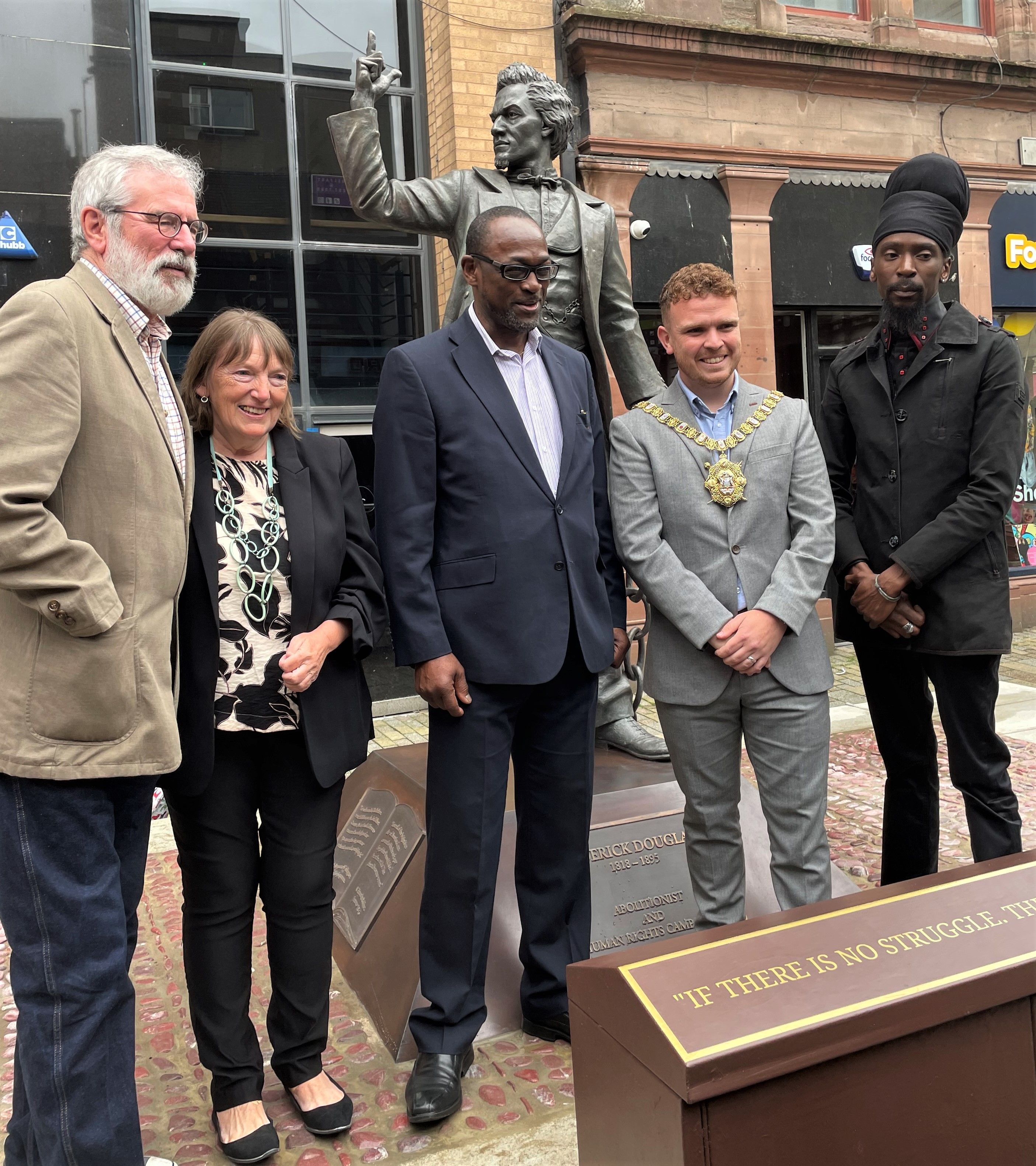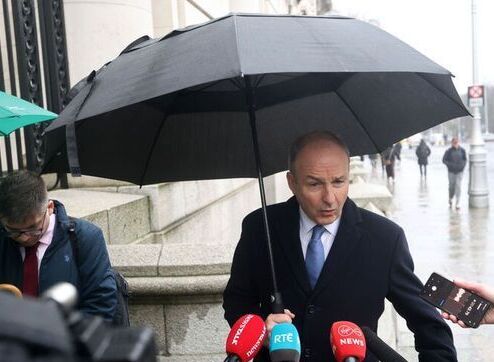A great crowd turned out on Monday morning in Lombard Street in Belfast City Centre for the unveiling by Belfast City Ard Mheara (Lord Mayor) Ryan Murphy of a very fine statue of Frederick Douglass, escaped slave and human rights campaigner.
It is a striking image of Douglass who is an iconic figure for his work on campaigning for an end to slavery and for equality and justice for African Americans and for women. He visited Ireland in 1845-46, just before the worst years of The Great Hunger.
He gave over fifty speeches during his time here. They are evidence of his great affection for Ireland and his recognition of the connection between the treatment of African Americans and of most Irish people in the 19th century under British rule. His words are a reminder of the evil and horror that was and is slavery, and of the work of the anti-slavery movement that was active in Ireland during his visit.
Slavery had been opposed by radical Presbyterians in Belfast in the late 18th century. Efforts to form a slave company in the city were thwarted not least through the efforts of Thomas McCabe, a United Irishman. Decades later, a Ladies Anti-Slavery Society carried on that good work. One of its founding members was Mary Anne McCracken, sister of Henry Joy McCracken.
Douglass published his autobiography, "The Narrative of the Life of Frederick Douglass, An American Slave" in 1845. The threat that pro-slaver elements would kidnap him and return his as a slave to his former "owner" was so great that he left the USA.
Frederick Douglass now has a permanent memorial in Belfast.
He arrived in Dublin where on 3 September 1845 he gave his first lecture. Over the following months he travelled to Wexford, Waterford, Cork, Limerick and Belfast. He returned to Belfast another four times.
Ireland was in his own word “transformative.” He also witnessed the awful conditions endured by Irish peasants and the impact of An Gorta Mór – the Great Hunger. Consequently, Douglass increasingly saw the issue of slavery not in isolation, but as part of a wider campaign for equality and social justice. He wrote: “I see much here to remind me of my former condition, and I confess I should be ashamed to lift up my voice against American slavery, but that I know the cause of humanity is one the world over.”
At the unveiling of the statue there was a group of young people from universities across the USA who are Frederick Douglass Fellows. They have been in Ireland for a week learning about his time here. Also present were Professor Christine Kinealy and Don Mullan, who have written extensively on Douglass, and Takura Donald Makoni, who is a policy officer with the African Caribbean Support Organisation in Belfast.
Christine Kinealy is a historian, author and founding director of Ireland's Great Hunger Institute at Quinnipiac University in Connecticut. She has written extensively on Daniel O’Connell, the Great Hunger and, of course, Frederick Douglass. In 2018 she published two authoritative volumes on the life and times of Douglass and his visits to Ireland, and to Belfast.
Douglass’s close association with Belfast is a part of our history that needs to be told and retold. It is also a reminder that the evil of slavery, and the desperate plight of refugees and asylum seekers, are still with us.
Slavery is not the past. It is the present. Modern slavery may involve multiple forms of exploitation, including human trafficking, child slavery, servitude, forced marriages and forced or compulsory labour. Many are women forced into prostitution or domestic servitude. Women's Aid Belfast and Lisburn has recently reported that they are currently dealing with more than 230 female victims of human trafficking. In addition, there are millions across the world dispossessed and fleeing war and hunger in their own places. Refugees and asylum seekers who deserve our solidarity and support.
So, the work of Frederick Douglass is not finished. Much progress has been made but the issues of racism and inequality and slavery continue to challenge society today. Last Christmas the United Nations International Labour Organization reported that as many as fifty million people are trapped in slavery. These are men, women and children who “cannot refuse or cannot leave because of threats, violence, deception, abuse of power or other forms of coercion.”
There is an obligation on all of us to speak out – just like Frederick Douglass, Thomas McCabe, Mary Ann McCracken and many others. Frederick Douglass’s statue in the heart of Belfast is a reminder of the proud history of this city in opposing slavery and of the work still to be done.
Well done to Belfast City Council, to the sculptor Alan Beattie Herriot and his associate and fellow sculptor Hector Guest. Fàilte abhaile Frederick.

Cork March
For the first time the annual National Hunger Strike Commemoration will be held in Cork City on Sunday 27 August to remember the ten 1981 hunger strikers and Michael Gaughan and Frank Stagg. First Minister designate Michelle O’Neill will be the main speaker.
The Cork event will also remember those Cork republicans Terence MacSwiney, Michael Fitzgerald, Joseph Murphy, Denis Barry and Andy O’Sullivan who died on hunger strike during the Tan War and the Civil War and all of those who died on hunger strike in the intervening years.
Those participating in the National Hunger Strike Commemoration will assemble at 2 p.m. at Kennedy Quay, Cork City. It will proceed through the city centre to the National Monument at Grand Parade. Bígí linn.
Prison Pen
Prisoners Day is an important date in the Féile an Phobail calendar. The event, on August 11 in the Felon’s Club, is an opportunity to look at exhibitions, hear talks on issues affecting former POWs, including this year an up-to-date on the CR Gas campaign.
A few weeks ago I noted the upcoming launch at Prisoners Day of a wonderful book of poetry, "The Pen Behind The Wire," by Eoghan "Gino" MacCormaic. At the back of the book there is a list of family and friends and comrades who recorded some of Gino’s poems with QR codes for readers to listen to the spoken word. Among the many contributors are his wife and other family members, Christy Moore, Lucilita Bhreatnach, Rosie McCorley, Gerry Kelly, mé féin and many more.
Gino follows in that centuries long tradition of republican political prisoners who used their time in English prisons to write about their experience. Gino writes about the international experience also and life beyond the walls of the H-Blocks where he spent 15 years – five of them on the blanket.
There are 76 poems in "The Pen Behind The Wire." Well done Gino. Among them is "Easter 1982." It is a recollection of the first Easter parade in the Blocks at which the names of their fallen hunger strike comrades were read out. Here it is.
Easter 1982
The Roll of Honour was read, proudly,
And this year I listened, hearing for the first time
Bobby, Frank, and Raymond, Patsy, Joe,
Martin and Kevin, Kieran, Tom and Mickey.
I remembered then, in that yard
In the quietness of Long Kesh, Easter 1982
I remembered another Easter, two years before
When we stood, with the Ten
Behind our locked doors.
Naked but for our robes, our blankets. On protest.
We thought, that day, that we would lose ten comrades
On hunger strike, demanding rights that now were greater
Than clothes? And two years on
Who could say the hunger strikers did not win?
Two minutes of silence. Parade! Dismiss!
And for a moment I heard again the soft sound
Of five hundred bare feet stamping on the floor.
SINEAD
My thoughts are with the family and friends of Sinead O'Connor. Acres of words have been written about her since the sad, abrupt, news of her death. But the most poignant are the stories of the many quiet acts of kindness she was involved in.
A fierce warrior woman with a mighty voice and a good heart. Sinead was sound. An inspirational part of what we are. Go ndeanfaidh Dia trocaire uirthi.








